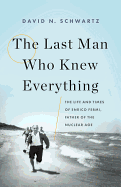
Outside of physics, Enrico Fermi is not well known, despite having won the Nobel Prize. He ushered in the atomic age with his discovery of beta decay and his pioneering experiments with controlled nuclear fission. The latter led directly to the development of the first atomic bomb, which he helped oversee. The long shadow cast by the mushroom cloud may account for Fermi's obscurity, but MIT professor David Schwartz sets out to rectify this in The Last Man Who Knew Everything.
Fermi was a rare breed of scientist, equally comfortable with theory and experimentation. He made several breakthrough discoveries in his short life, each a pillar of nuclear and quantum physics. He devised and built the first nuclear reactor under the bleachers at the University of Chicago, and was a key member of the Manhattan Project team at Los Alamos. He was also a devoted teacher: many of his students would go on to win the Nobel Prize. "Fermi problems" were ingenious shortcuts to solving difficult problems with remarkable speed and accuracy--essentially, he invented napkin math. Jocular, athletic and disinclined toward philosophy or politics, he never strongly opposed fascism, though he eventually spoke out against development of the hydrogen bomb.
Cradle-to-grave biographies are difficult to dramatize, and a dearth of written correspondence doesn't make it easier. Schwartz admirably balances Fermi's life, work, context and personality. His descriptions of the science sometimes sizzle and sometimes slump, but he shines when tracing Fermi's journey through academic, political and military institutions. --Zak Nelson, writer and bookseller

